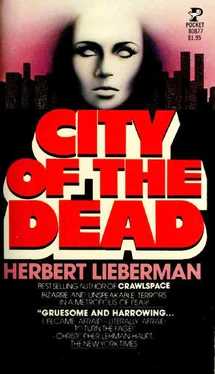“Blaylock showing the proper moral outrage, is he?”
“You ought to hear the stuff,” Benjamin fumes. “Makes you want to puke. All the self-righteous trumpetings. ‘This sort of thing will not be tolerated.’ ‘I will not permit—’ So forth and so on. You know the garbage.”
Konig’s fingers drum idly on his desktop, the sound, percussive and loud, echoing, through the shadows. “I fudged it up there at Binney’s this morning, Maury,” he announces suddenly. “Carslin knew I was fudging and so did Binney. And you, of course, wanted me to fudge it, Maury. Don’t deny it. ‘Don’t make waves’ is the gist of everything you’ve been telling me for the past week.”
“Now just a minute—”
“Not exactly in those words. But the essence of what you’ve been telling me is that the Medical Examiner’s Office couldn’t stand another scandal. No more bad publicity.”
“Well,” Benjamin snarls, the old truculence back in his voice, “if that’s what I’ve been telling you, it hasn’t helped things very much. As far as more bad publicity goes, you’ve got it. In spades. The story’ll be in every paper tomorrow morning. And what I neglected to tell you is that a couple of U.S. congressmen from Robinson’s district, who just happen to be running for re-election this year, are now demanding a full grand jury investigation. Binney has no choice other than to call the grand jury into session.”
“Good.”
“Good?” the Deputy Mayor splutters.
“I deserve everything I get.” Konig laughs, a long, harsh, mordant laugh.
“I don’t see what the hell’s so funny.”
“Everything. Everything’s funny. You and me, Maury. We’re funny. And the Mayor’s funny, too. Everybody’s funny. There is a justice, isn’t there? Oh, I don’t mean the whorehouse justice of a courtroom with a lot of sons of bitches dancing through a charade. I mean something beyond that. Far beyond that.” He laughs again, cackling almost gleefully. “And the funniest thing of all is me. All my life I’ve been fighting this sort of thing. These hypocrites. These trimmers and bastards. These son-of-a-bitch liars trying to cover their tracks in the slime. And now, Maury, the funniest thing of all is that I’m one of them. Tell His Honor I’ll be there at ten a.m.”
When Konig hangs up it is almost dark in his office. A comforting darkness to cover his desolation.
“Dr. Konig.”
“Yes.”
“Go to your front door.”
“What?”
“Open it, but don’t step out the door or make any false move.”
“What? What the hell is—”
7:00 p.m. Konig’s Home.
A click, then silence.
“Hello—hello—hello.” Konig stands holding the phone, peering hard into its mouth, a feeling as if he’d been kicked in the stomach. “Who’s this?” he shouts but hears only the sound of silence roaring back at him through the wires. “Who’s this?” he mutters again, dumb with fright. But he knew who it was. That voice, quiet, infinitely refined, was unmistakable.
Turning now he stares wildly at the window. Then in the next moment he is striding, lurching, tripping across the dining room, through the library, the living room, plunging headlong through the front hall, and standing, finally, shirt-sleeved at the open door.
The soft April dusk is poised quiveringly on the verge of becoming dark. Framed in the orange glow of antique coach lanterns hung on either side of the door, Konig squints through the thickening shadows down his front walk. He can see nothing. It’s the supper hour. Lights flicker from the windows of surrounding homes, but the streets are strangely deserted.
His eyes suddenly adjusting to the dark, Konig sees at the foot of his front walk the squat silhouette of a small foreign-built car. It’s almost directly on a line with the front door and pointed up the street. In that light he can discern neither the color nor the model of the car, but he can hear its motor idling there in neutral.
In the next moment he hears the click of a door opening. The dim illumination of a dome light suddenly floods the car’s interior. It is quite easy to see four distinct heads in the car.
Craning his neck, he squints harder. There’s movement going on within the car. Then from one of the rear doors he sees a figure emerging, or being pushed out.
Remembering the order not to step outside the door, he waits breathlessly. Someone is now standing by an open rear door. Not really standing so much as leaning, or being propped up from behind. The figure appears to wobble drunkenly, and in the dim illumination of the dome light he can see hands reaching up from behind, gripping the upper arms of the wobbly figure, supporting it.
The figure standing there at the foot of the walk has a rag-doll quality.-Its legs won’t support it. Its head lolls like a puppet’s to the side. Slowly now the head rises and as if with great effort appears to be gazing directly at him. In that light he cannot see the face, but he knows it is a female’s, and he knows the outline of the head, the stature—
Lolly Konig is standing at the foot of the walk, perhaps fifteen yards off in the dusk, so close he might almost reach out and touch her. Because she totters and wavers so, he has an impression she’s drunk. Or more probably under heavy sedation. If it weren’t for the two hands supporting her from behind, she’d crumble right there where she stood. She appears to be holding her head up with tremendous effort, trying to see him. He can hear voices muted and conversant behind her. He stares back hard, struggling to see her face.
Suddenly she slumps. A cry strangles in his throat. He starts down the front steps. The moment he moves, however, there’s a scramble in the area of the car. He hears more voices. The rag-doll figure is yanked back into the car. There’s the sound of several doors slamming and a motor being gunned.
At the foot of the walk, paralyzed and grieving, Konig watches the two red taillights recede into the darkness, turn the corner at the end of the block, then disappear. For several moments, however, even with the car out of sight, he can hear the mocking roar of its motor.
He stands there for some time, riveted to the spot, staring at the point where the car had disappeared, as if willing it to come back. The air is heavy with the languid scent of honeysuckle and lilac. Permanence and serenity appear to be everywhere this night. How many such nights had he sat outside with Ida and Lolly, barbecuing steak, having a drink, laughing, chattering over the day’s work. The soft glow of lights from the windows of neighboring homes flicker prettily all about him. Beyond those windows, families are gathered for the evening meal. People talk and chatter and laugh over the day’s events, lulled by the illusion of a benign universe.
Konig turns now, hearing the ringing of a phone coming harsh and insistent from within the house. In a matter of moments he’s back up the stone walk, up the stairs, through the front door, and into the hall where the phone is shrieking at him.
“Dr. Konig.”
“Speaking.”
“That was awfully stupid what you did today.”
“Yes, I know. I’m sorry.”
“By all rights I should have killed her immediately.”
“Please don’t hurt her. It was my fault—I—”
“Never trust yourself to the police. The police are bunglers. And the Bureau agents are even worse. They’re retarded.”
“I’m very sorry about all that. It wasn’t any—”
“My associates are infuriated. They know you tried to screw us today. Now they insist I execute your daughter at once. As retaliation.”
“Please don’t hurt her,” Konig can hear himself pleading.
Читать дальше












